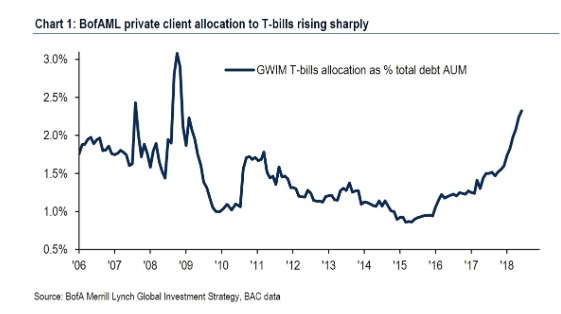Equities markets are duller than dull right now and for the wealthy investor in the U.S. it may be about more than just the summer blues. It’s dull enough, in fact, that the wealthy are pouring back into cash according to a CNBC survey of American millionaires who said that in the next year they’re more likely to stock up on cash and bonds than equities.
Markets are in correction mode, and wealthy investors aged 55 and under, and investors with $5 million are more, are no longer keen on pumping money into the stock market.
According to the survey, conducted for CNBC by Spectrem Group back in April—and since then the stock markets have gotten worse—short-term investments are on the rise among the wealthy, and equities outflows are hitting new records.
And it’s not just those with $5 million. The survey of 750 Americans with $1 million or of investable assets showed a similar pattern.
Of all millionaires surveyed, only 17 percent said they planned on increasing their exposure to equities in the next year, while 25 percent said they planned to increase short-term holdings in that same time period. Some 34 percent of investors with $5 million or more in investable assets said they would increase short-term holdings. Related: The Stock Market’s Self-Fulfilling Prophecy
Among millionaires aged 55 and under, the safer investments will be cash, money market accounts, CDs, Treasury bills and even checking and savings accounts.
Merrill Lynch said its private client allocations show a surge in T-bill holdings rose to 10-year high, as seen in the chart below.
And confidence in the S&P 500 is at a low point. Since the last survey in the fall of 2017, according to CNBC, the confidence has dropped by 20 points.
But even though we’ve seen a major withdrawal from the U.S. stock market, and global markets, too, it doesn’t necessarily mean everyone’s bearish. It may just mean that the wealthy are waiting for better opportunities that they’re just not seeing right now.
Last week, the U.S. stock market saw a major uptick in the pace of investor sell-offs, while at the same time a lot of money poured into Treasury bills.
According to Merrill Lynch, private client allocations showed a surge in T-bill holdings to a 10-year high:

(Click to enlarge)
While risky bonds are on trend, investors are scooping up municipal bonds, government bonds, and Treasury inflation-protected securities (TIPs).
Reports put the total outflow from U.S. stock funds and ETFs at $24.2 billion last week, compared to a $30-billion selloff in global stock funds.
For the U.S. sell-off, that was the third-biggest outflow in history. For global markets, it was the biggest since the financial crisis, according to CNBC, citing Bank of America.
The tariff tit-for-tat that’s leading to an all-out trade war has everyone on edge, of course. Bank of America’s chief investment strategist, Michael Hartnett, told CNBC that investors are nervous so we’re seeing “a big unwind of positioning, a flight to quality”.
By David Craggen for Safehaven.com
More Top Reads From Safehaven.com:
















